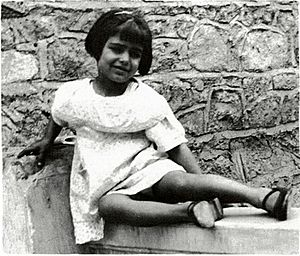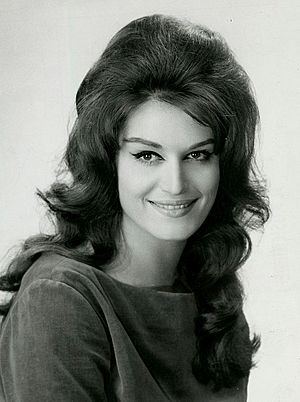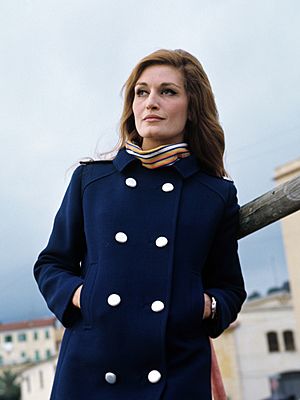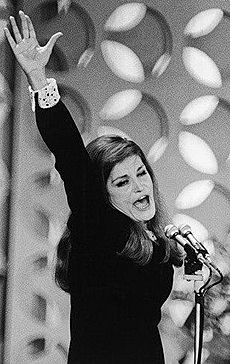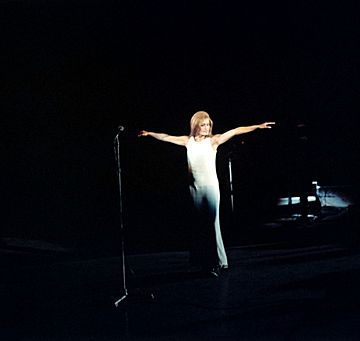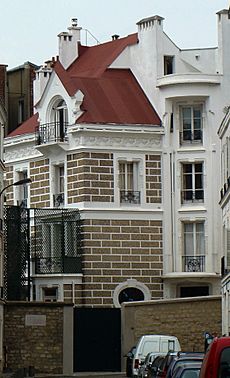Dalida facts for kids
Quick facts for kids
Dalida
|
|
|---|---|
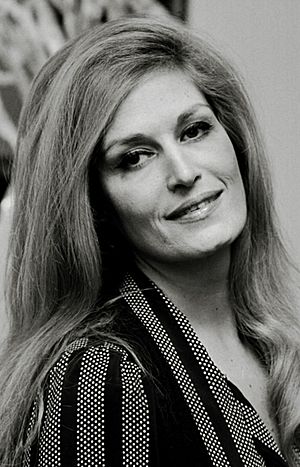
Dalida in 1974
|
|
| Born |
Iolanda Cristina Gigliotti
17 January 1933 |
| Died | 3 May 1987 (aged 54) Paris, France
|
| Burial place | Montmartre Cemetery, Paris |
| Monuments | Dalida tomb Bust at Place Dalida |
| Other names |
|
| Occupation |
|
| Spouse(s) |
Lucien Morisse
(m. 1961; div. 1962) |
| Partner(s) | Luigi Tenco (1966–1967) |
| Musical career | |
| Genres | |
| Instruments | Vocals |
| Years active | 1956–1987 |
| Labels |
|
| Signature | |
Iolanda Cristina Gigliotti (born January 17, 1933 – died May 3, 1987), known as Dalida, was a famous singer and actress. She was born in Egypt and had Italian and French roots. Dalida sold an amazing 140 million records around the world. This makes her one of the top-selling Italian music artists ever.
Some of her most famous songs include "Bambino", "Gondolier", "Les enfants du Pirée", "Le temps des fleurs", "Darla dirladada", "J'attendrai", and "Paroles, paroles". The song "Paroles, paroles" also featured spoken words by actor Alain Delon.
Dalida started her career as an actress. She appeared in the film A Glass and a Cigarette in 1955. A year later, she signed with the Barclay record company. She quickly found success as a singer with "Bambino". From 1957 to 1961, she was the top record seller in France. Her music was popular in many countries across Europe, Latin America, North America, and Asia.
Some of her biggest hits were "Le jour où la pluie viendra", "Gigi l'amoroso", "J'attendrai", and "Salama ya salama". She also sang with other famous artists like Julio Iglesias, Charles Aznavour, Johnny Mathis, and Petula Clark.
Even though she was a successful singer, Dalida still loved acting. She returned to movies with The Sixth Day in 1986. This film was a big hit in Egypt, where three million people came to see Dalida at a special showing. In France, critics liked the movie, but it did not do well at the box office.
Dalida faced many personal challenges. After a difficult time in 1967, she continued her career. She started her own record label, International Show, with her brother Orlando. She kept recording music and performing concerts. Dalida passed away on May 3, 1987.
Contents
- Early Life
- Career Highlights
- The Barclay Years: Early Success
- First Contract and "Bambino"
- First Olympia Concert and "Gondolier"
- International Success and "Am Tag als der Regen kam"
- "Les enfants du Pirée" and "Itsi Bitsi petit bikini"
- "La Leçon de Twist" and "Le petit Gonzales"
- Focus on Concerts and "Amore scusami"
- "La Danse de Zorba" and "Il silenzio"
- Sanremo and Olympia 67: A New Beginning
- "Le temps des fleurs"
- The Orlando Years: Taking Control
- The Barclay Years: Early Success
- Personal Life
- Legacy
- Discography
- Filmography
- Awards
- See also
Early Life
Growing Up in Cairo
Dalida was born Iolanda Cristina Gigliotti in Cairo, Kingdom of Egypt, on January 17, 1933. Her parents, Pietro and Filomena, were from Serrastretta, Calabria, Italy. Pietro was a musician who played the violin, and Filomena was a seamstress. Because both her parents were Italian, Dalida automatically became an Italian citizen when she was born.
Her parents moved to Cairo to find work. They settled in the Shubra district. Dalida had an older brother, Orlando, and a younger brother, Bruno. Her father became the lead violinist at the Cairo's Khedivial Opera House. This helped the family buy a two-story house.
When Dalida was 10 months old, she had an eye infection. She had to wear bandages for 40 days. Her father played lullabies on his violin to comfort her. She had eye operations between the ages of three and five. She wore glasses in elementary school, which made her a target for bullying. She once said she would rather see the world blurry than wear them. Dalida went to an Italian Catholic school in Shubra.
In 1940, during World War II, her father was taken to a prison camp. When he returned in 1944, he was a changed person. Dalida remembered him being violent. She was 12 when her father died in 1945. This sad event affected her deeply for the rest of her life.
Becoming a Model and Actress
As a teenager, Dalida became interested in acting. Her uncle worked as a projectionist at a local cinema. She often took part in school plays. After graduating in 1951, she worked as a typist at a medicine company. Even though she needed to work to help her family, she still dreamed of acting.
Her friend Miranda encouraged her to enter a beauty pageant called Miss Ondine. Dalida won second prize. Her photo was published in newspapers. Her mother was upset at first and cut Dalida's hair short. But eventually, her mother agreed, and Dalida left her job to become a model. She worked for a fashion house called Donna in Cairo.
Three Egyptian film directors noticed Dalida. She appeared in The Mask of Tutankhamun (1954) and A Glass and a Cigarette (1954). For the second film, she started using the stage name Dalila. She said she liked the name because it was common in Egypt.
Moving to Paris and a Lucky Dice Game
On December 25, 1954, Dalila moved from Egypt to Paris. She stayed with a friend of a director. She tried out for many movie roles but did not get any. She later moved to a smaller apartment. Her neighbor was Alain Delon, who was not famous yet. They had a short relationship.
Since acting was not working out, Dalila decided to try singing in 1955. She met Roland Berger, a singing teacher. He gave her lessons every day. He was strict, but Dalila always came back. Berger helped her perform at a cabaret called Le Drap d'Or. There, she was noticed by Jacques Paoli, who booked her for more shows.
Dalila became more known to the public. Bruno Coquatrix, the director of Olympia, invited her to a singing contest. Coquatrix later said her voice was "full of color and volume." Author Alfred Marchand suggested she change her name to Dalida. He thought it sounded better and would help her career. She liked the idea and changed it right away.
On April 9, 1956, Dalida sang "Etrangère au Paradis" at the contest. Before the show, Eddie Barclay, a record company owner, and Lucien Morisse, a radio director, met. They decided to go to the contest after playing a dice game, which Morisse won. All three men were very impressed by Dalida. They set up a meeting with her. This meeting was very important for Dalida's career.
Career Highlights
The Barclay Years: Early Success
First Contract and "Bambino"
After the contest, Lucien Morisse invited Dalida to his office. She sang for him, and he was pleased. On May 2, 1956, Dalida signed a one-year contract with Barclay. Morisse was in charge of promoting her on the radio. Coquatrix planned concerts for her, including shows at the Olympia.
Her first song, "Madona", was released in August 1956. It did well enough for a second song, "Le Torrent", to be released a month later. Dalida continued to perform live. Her team worked to find a song that would make her a star. Morisse asked for a French version of "Guaglione", which became "Bambino."
"Bambino" was released in December 1956. It quickly became very popular. It was the main song on Dalida's first album, Son nom est Dalida. The song reached number one in France in January 1957. It stayed at number one for 39 weeks, which is still a record! "Bambino" made Dalida an overnight star. She received her first gold disc on September 19, 1957, for selling over 300,000 copies. This was the first time a woman received such an award.
First Olympia Concert and "Gondolier"
On February 27, 1957, Dalida performed her first concert at the Olympia. She opened for Charles Aznavour and received great applause. In April, she had a successful two-week series of concerts. A fan club was even started for her, the first for a female artist.
Her song "Miguel" became number one in France in October. Dalida returned to the Olympia in September. She opened for Gilbert Bécaud. Their names were the first to appear on the Olympia's new red neon sign. Dalida released her second album, Miguel. She also recorded "Histoire d'un amour", which became another gold disc winner.
Dalida tried new musical styles. Her song "Gondolier" was released in December 1957. During a TV performance, her dress strap fell down. This moment became famous later on. "Gondolier" went straight to number one in France and Canada. It stayed in the top 20 for almost a year. Its B-side, "Pardon", also reached number one in Canada. Dalida started performing more often in France, Belgium, and Luxembourg.
By April 1958, her song "Dans le bleu du ciel bleu" became number one in France. Dalida had five songs in the top ten at the same time, which was a record! She won the RMC's singer of the year award for six years in a row. In June, she started her first "Tour de France with Dalida" (TDF avec Dalida 58). She performed daily in cities along the Tour de France route. She also sang in Algiers to support French soldiers.
Dalida released her third album, Gondolier. She recorded new songs like "Je pars", "Aïe mon cœur", and "Les Gitans". All of these sold well and earned her gold discs. With "Je pars", Dalida helped bring rock 'n' roll to France.
In late 1958, Dalida returned to acting. She played a singer-spy in Rapt au deuxième bureau. She also appeared as herself in Brigade des mœurs. These movies helped promote her songs. In October, she performed at Bobino for three weeks. Her songs "Du moment qu'on s'aime" and "Come prima" topped the charts. "Come prima" was a big holiday hit. Its B-side, "Si je pouvais revivre un jour ma vie", was also a hit in Canada.
In December 1958, Dalida met Norman Granz, an American music producer. He invited her to Hollywood and offered her a 15-year contract to start her career in the USA. She turned down the offer. She wanted to focus on her music in France, where she already had many fans.
International Success and "Am Tag als der Regen kam"
Dalida toured a lot in 1959. She had sold-out shows in France, Egypt, Italy, and Germany. As she became more famous outside France, she started recording songs in other languages. She could sing in eleven languages: German, Egyptian Arabic, English, Lebanese Arabic, Spanish, French, Greek, Hebrew, Italian, Japanese, and Dutch.
In February, she sang her version of "Hava Nagila" on TV. On March 2, she received the Bravos du music hall award. This was France's most important music award for the most popular singer.
In late summer, Dalida recorded her first major international hit. "Le jour ou la pluie viendra" was recorded in three languages. It reached the top three in six different European countries. The German version, "Am Tag als der Regen kam", was number one in Germany for ten weeks. It became the best-selling record of the year in Germany and earned her another gold disc. Dalida received a Goldener Löwe award at the Berlin International Film Festival for being the best-selling artist in Germany. This song was her first big international success.
In 1959, Dalida had five Top 10 hits in France. These included "Ciao, ciao Bambina" and "Guitare et tambourin", both earning gold discs. In Italy, she won awards for being the best-selling artist. Dalida also performed sold-out concerts in Berlin, Athens, and Cairo. By the end of the year, she had sold three and a half million records. This was the highest among all European artists.
"Les enfants du Pirée" and "Itsi Bitsi petit bikini"
Dalida started 1960 with "T'aimer follement", a number one hit in France and Belgium. She then went on her first world tour. She reached the top of the charts again with "Romantica" in April.
Her third song of the year, "Les enfants du Pirée", was a huge success. It became her second big international hit. It reached the top two in six European countries and Canada. It was number one in three of them. After being number one in France for 20 weeks, it became the first song by a French singer to sell over one million copies worldwide. The phrase "tube de l'été" (summer hit) was created because of this song. Dalida recorded it in five languages and made a music video.
She won more awards in Italy for being the best-selling artist. Back in France, Dalida noticed a new music style called yé-yé. She felt her music was becoming old-fashioned. To stay popular, she decided to change her style. In September, she covered the US hit "Itsi bitsi petit bikini". This song became one of her signature tunes. It was the first big yé-yé hit in France. It helped Dalida connect with a new generation of young fans. It sold over a million copies and earned her a thirteenth gold disc.
Her next success was "Milord", which was number one in Austria, Germany, and Italy. Dalida then completed a year-long world tour. She performed in Europe, Canada, and several Arab countries. In December, she released a Christmas EP called "Joyeux Noël". Her New Year's TV show had nearly six million viewers, setting a record.
In January 1961, Dalida covered The Drifters' "Save the last dance for me" as "Garde Moi la Derniere Danse". It reached number two in France. She spent most of 1961 on another world tour. It started in Tehran in February, where she performed for the Iranian royal family. The tour included almost 200 shows. It ended with Dalida's first concert series at the Olympia in Paris, starting on December 6.
Some critics thought Dalida's career was ending. But her Olympia show was a huge success. It was sold out for a month. Édith Piaf congratulated her, saying, "You are a winner, like me. After me, it will be you." Dalida set a record for the most people attending a concert series at the Olympia. Over 52,000 people saw her perform in 30 days.
In 1961, Dalida released new Italian songs. She also had several top ten hits internationally, like "Nuits d'espagne" and "Tu ne sais pas". She made "Pépé" a number one hit in Austria and Germany. "24 mille baisers" was number one in Austria and France. She also released two albums, Dalida internationale and Loin de moi. Dalida started acting in movies again. She played the main role in the Italian film Che femmina... e che dollari!. This movie was later called "Parlez moi d'amour" for French audiences. It was her first color film and showed her acting talent.
"La Leçon de Twist" and "Le petit Gonzales"
After a short break, Dalida went on tour again. In Canada, her song "Tu peux le prendre" reached number one. On February 5, Dalida performed her new yé-yé song "La Leçon de Twist" on TV. Johnny Hallyday played the piano and taught her the dance moves. This performance was a sensation. Her song quickly became number one in France and Belgium.
Another yé-yé hit followed, "Achète-moi un Juke-box". Dalida even joked about herself in the lyrics, mentioning that young people preferred new singers like Elvis Presley and Johnny Hallyday. This song also reached number one for two weeks.
From April to July, Dalida toured Italy and Vietnam. In Saigon, her popularity caused traffic jams. But local authorities stopped her show during "La Leçon de Twist" because they thought it was a political act. In May, Dalida was back on top of international charts with "Le petit Gonzales". This was a cover of "Speedy Gonzales". It was a hit in France, Belgium, Canada, and Spain. It is still remembered as a classic yé-yé song. An album of the same name was released later that year.
Dalida filmed her first music video, called a scopitone, in 1961 for "Loin de moi". In September 1962, she made her most famous scopitone for "Le jour le plus long". In this video, she paid tribute to Allies' landing in Normandy during World War II. Dalida dressed as a soldier and walked through a war-torn forest. The video also showed real scenes from the war. This unusual image of Dalida was a hit. "Le jour le plus long" was number one in France for two weeks and earned her a gold disc.
Focus on Concerts and "Amore scusami"
In 1963, Dalida spent most of her time performing live around the world. She focused on her young fans in Canada. Her world tour was very successful. She had sold-out concerts in Europe, Canada, Asia, and Arab countries. In Algeria, she was the first artist to perform after the country became independent. Dalida also spent three months in Hong Kong filming a movie called L'Inconnue de Hong-Kong with Serge Gainsbourg. Even though the movie did not do well, Dalida received good reviews for her acting.
In January 1963, Dalida won an award for being the most listened-to artist on jukeboxes in Europe. Later that month, she changed her musical style. She covered Ben E. King's "Stand by Me as "Tu croiras". This was followed by more thoughtful songs like "Le jour du retour" and "Eux". "Eux" was a hit in Argentina and was recorded in five languages. It won an award for having the most international sales by a French artist in 1963. Dalida named her fourteenth album Eux after it.
Her 1963 world tour continued into 1964. The French part of the tour started in April 1964. Dalida traveled 30,000 kilometers by car and performed for over 200,000 people. A memorable moment was her concert in Draguignan in August. She appeared with blond hair for the first time, which surprised the audience. After a concert in September, Dalida became the honorary godmother of local truck drivers. Two days later, she arrived at the Olympia for a concert series. She and other stars like Charles Aznavour and Johnny Hallyday rode on the truck drivers' roofless trucks through Paris. This event created a lot of excitement for her sold-out shows.
While touring, Dalida also recorded new songs. Some of these, like "Ce coin de terre" and "Ne t'en fais pas pour ça", did not get much TV promotion. "Là il a dit" reached number six in Canada. In November, Dalida recorded "Amore scusami", a new orchestral pop song. It quickly became a hit at the end of the year and earned her another gold disc. Following its success, an album of the same name was released. On September 17, Dalida received a platinum disc. This award was created just for her. It recognized her sales of over 10 million records since 1956.
Dalida released an EP called Sanremo 65. It included her Italian hit "Ascoltami". She performed at Bobino and Tête de l'Art. Her cover of Rita Pavone's "Viva la pappa" was popular with children. The song "La sainte totoche", written by Charles Aznavour, was a hit in Turkey. In 1965, Dalida toured the world again. In Fort-de-France, over 20,000 fans came to see her. A poll in April 1965 voted Dalida as the favorite French singer of the decade, ahead of Édith Piaf.
"La Danse de Zorba" and "Il silenzio"
In June 1965, Dalida recorded "La Danse de Zorba". This song was from the 1964 movie Zorba the Greek. It became her biggest international hit since 1961. The song reached the top three in six countries and was number one in two. It sold over a million copies and earned Dalida two more gold discs. Dalida often danced the Sirtaki on TV while promoting the song. "La Danse de Zorba" was named the "summer hit" of 1965.
During the summer, Dalida performed in Morocco and Algeria. She also acted in an Italian comedy movie called Menage all'italiana. In October, her song "Il silenzio" was released. It was a chart-topping hit in Europe, Canada, and Latin America. It reached number one in France and Italy. It was the best-selling record of the year in Italy and received a gold disc. Other songs like "Le flamenco" and "Scandale dans la famille" were also popular. The success of "Il silenzo" made 1965 Dalida's most successful year so far. An album with the same name was released.
1966 was a busy year of touring for Dalida. She had over 150 shows in Canada, Latin America, Arab countries, and Europe. The year started with "El Cordobés", a number one hit in Latin America. Dalida dedicated this song to bullfighter Manuel Benitez, with whom she had a brief relationship. Dalida also started working with her family. Her cousin Rosy became her secretary, and her brother Bruno became her artistic director. They produced a successful Italian album, Pensiamoci ogni sera.
"Parlez moi de lui" was one of her first power ballads. It was based on her own life experiences. "Bang Bang" was a number one hit in Argentina and Italy. "Petit homme" was popular internationally. Dalida also acted in a French movie called La Morale de l'histoire. In the summer, she met singer-songwriter Luigi Tenco in Rome. In September, her Italian managers suggested she perform with Tenco at the next Sanremo Music Festival. Dalida agreed because she was in a secret relationship with Tenco.
Sanremo and Olympia 67: A New Beginning
In January 1967, Dalida had success with "Mama" in France and Turkey. "Ciao amore, ciao", written by Tenco, was chosen for their performance at the Sanremo Music Festival 1967. The festival started on January 26. Tenco's performance was not good, but Dalida received applause. However, they were both eliminated. The next night, Tenco was found dead by Dalida in their hotel room. This event deeply affected Dalida. Her concert on January 31 was canceled.
On February 7, Dalida appeared on TV. She sang "Parlez moi de lui" for Tenco. She wore the same dress she had on when she found him. Her performance was very emotional. On February 26, Dalida tried to take her own life. She ended up in the hospital and was in a coma for five days. The public learned about her relationship with Tenco. Her career was put on hold for three months.
Dalida returned to TV on June 8. She sang "Les grilles de ma maison", a cover of Tom Jones' "Green, Green Grass of Home". The lyrics were about her return to life. At the same time, her Italian album Piccolo ragazzo was a hit. "Ciao amore, ciao" topped several international charts and earned Dalida another gold disc. She also went on a four-month comeback tour. In September, Dalida released her first collection of hits, De Bambino à Il silenzio.
On October 5, Dalida started her third concert series at the Olympia. It lasted a month. She sang new songs like "J'ai décidé de vivre" and "Entrez sans frapper". Dalida changed her style to more meaningful lyrics. She wore a long white dress that became her signature look. She was a huge success at the Olympia. The press called her "Saint Dalida." A journalist wrote, "Dalida killed Mademoiselle Bambino. The new Dalida is born!"
"Le temps des fleurs"
In January 1968, Dalida won the Canzonissima TV show in Italy with "Dan dan dan". It reached number two in Italy. Dalida also returned to acting in a main role after five years. She starred in the Italian romantic drama Io ti amo. The movie was a small success. It was filmed in color and featured her new songs.
After filming, Dalida went on a two-year world tour. She performed over 300 live shows. In 1969, she performed in Yugoslavia and parts of Africa for the first time. The tour ended in Iran in February 1970.
"Si j'avais des millions" and "La bambola" were minor hits in early 1968. But in September, Dalida had a huge success in France with "Le temps des fleurs". It was an instant number one hit. It was released five more times by Barclay. It received a gold certificate, and an album with the same name was released. "Le temps des fleurs" also marked the end of the long-playing EP era.
On December 5, 1968, Dalida received the Medal of the President of the Republic from Charles de Gaulle. He praised her "success, kindness and modesty." She is the only person from show business to receive this honor in France. Dalida also became an honorary citizen of Paris. She was named the Godmother of Montmartre pulbots, which were poor children from her neighborhood.
In 1969, Dalida toured and traveled to India. She released less successful songs like "Zoum zoum zoum" and "L'an 2005". "Oh lady Mary" was her last Italian hit. She returned to German TV and danced the casatchok to her new song "Petruschka". She released three new albums: Canta in Italiano, In Deutsch, and Ma mère me disait. She won awards for being the best-selling artist in Italy and the Radio Luxembourg singer of the year.
The Orlando Years: Taking Control
Dalida and her brother Orlando had planned to start their own record company. Dalida's last record with Barclay was released on April 15, 1970. On July 1, Dalida signed with International Shows, Orlando's new company. This made him one of the few independent producers in French show business.
Their first record, "Darla dirladada", was a big success. This Greek folk song sold 75,000 copies in its first week. It set a record for weekly sales in France. "Darla driladada" became Dalida's "summer hit" again. It stayed at number one for three weeks and earned a gold certificate. Soon after, Dalida released "Ils ont changé ma chanson", a cover of "What Have They Done to My Song Ma". This song showed the big change in her music style. It was a moderate success and won her another Radio Luxembourg award. This was followed by "Pour qui pour quoi", her last EP, and "Ils ont changé ma chanson", her first album with International Show.
In October 1971, Dalida wanted to perform at the Olympia again after four years. The director, Bruno Coquatrix, did not believe in her new style. So, Dalida rented and paid for the venue herself. On November 24, Dalida started a sold-out three-week concert series. Mike Brant was her opening act. Dalida was a huge triumph. The public and critics loved her new songs. They called her "the queen of the theater." Coquatrix then offered Dalida to return to the Olympia whenever she wanted, without paying. The premiere night was recorded as a live album, Olympia 71.
In 1971 and 1972, Dalida had many successful concerts around the world. She performed in Asia, Canada, Europe, Lebanon, and Latin America. She chose new songs for their poetic meaning. Dalida often appeared on TV singing songs like "Comment faire pour oublier" and "Avec le temps". Fans started calling her "Dali." In September 1972, she had high sales again with "Parle plus bas". This was a cover of Godfather's title song. It reached number two and sold over half a million copies in France. It received a gold certificate.
"Paroles, paroles" and "Je suis malade"
In late 1972, Dalida recorded a duet called "Paroles, paroles" with her friend Alain Delon. The song is about a man who offers a woman "caramels, bonbons et chocolat" and tells her "how beautiful you are." The woman replies "words, words," meaning his promises are empty. The song was released on January 17. It was number one in France, Japan, Mexico, and Portugal. It received a triple gold certification. Many other singers covered it in different languages. Dalida and Delon never sang the song live together. Dalida performed it using his voice in playback. "Paroles, paroles" became one of Dalida's most famous songs. The phrase "paroles, paroles" is now used in everyday language to describe people who make promises they do not keep.
In late July, Dalida released another song that became her signature track: "Je suis malade". The writer, Serge Lama, had released it earlier, but it was not popular. Dalida saw it on TV and cried. She knew she had to record it. Dalida wanted to help Lama become famous, so she released her version as the B-side to her single "Vado via". After Dalida performed it, her version became a hit. Lama's original song also gained attention. Dalida's performances of "Je suis malade" were very emotional. The song is about feeling abandoned and sad. Her performances had a big impact on French society. Both Lama and the song's composer, Alice Dona, said that Dalida made the song a success and helped Lama's career. "Je suis malade" is often sung in competitions as a tribute to Dalida.
1973–1975: "Gigi" and "18 ans"
By the end of 1973, Dalida released "Il venait d'avoir 18 ans". This song quickly became popular. In early 1974, it was released again as the B-side to "Gigi l'amoroso". "Il venait d'avoir 18 ans" reached number 3 in Québec, number 4 in Belgium, and number 13 in Germany. "Gigi l'amoroso" broke the record for the most singles sold in Benelux. It was number 4 in France, number 1 in Switzerland, and number 2 in the Netherlands.
Dalida performed both songs during her concerts at the Olympia in 1974. All four weeks of shows were sold out and a big success. A live album, Olympia 75, was released afterwards.
1975–1980: Disco Era
In February 1975, French music critics gave Dalida the Prix de l'Académie du Disque Français. She toured from 1974 to 1975, selling many records. In 1975, she released a duet with her partner Richard, "Et de l'amour de l'amour", which reached number 16 in France.
At the end of 1975, Dalida released a new album. Most of the songs were in her usual style, but one was a disco song: "J'attendrai". This song was released as a single in January 1976. It reached number 1 on the French charts. It was the first disco hit in France and the first disco hit in French. Dalida is known as the "inventor of French disco." At this time, variety shows were popular on French TV. Dalida started appearing on TV every week in France and Europe.
After her disco success, she released a new album in mid-1976 with mostly disco songs. "Besame mucho" was a notable song, reaching number 7 in France. 1977 was a good year for Dalida. She released three albums. One was a live album, Olympia 77, after her successful four-week shows at the Olympia. Another album featured "Salma Ya Salama". This was the first Egyptian folk hit in the world. It was originally sung in Egyptian Arabic and later translated into French, Italian, and German. The lyrics are about missing home and celebrating Egypt.
Dalida continued touring worldwide. She performed in the USA for the second time, with two nights at New York's Carnegie Hall in November 1978. The New York Times praised her performance. Most of the audience were French citizens. She was offered another contract to perform in the USA, but she declined.
Other hit songs by Dalida include "The Lambeth Walk". In 1979, Dalida recorded her biggest disco hit, "Monday, Tuesday... Laissez-moi danser". It was a huge hit, reaching number 1 on the French charts. By the end of 1979, she released the song "Comme disait Mistinguett". In 1980, she released another big disco hit, "Rio do Brasil". Then came the album Gigi in Paradisco, which was a follow-up to her hit "Gigi l'amoroso".
In 1979, Dalida met Lester Wilson, who became her choreographer. They worked together for her show at the Palais des Sports in January 1980. Dalida performed for three hours a day for 15 days. She had ten costume changes and twelve dancers. About 90,000 people saw her perform. This was a huge success, similar to her Olympia shows.
After the show, Dalida released a live album, Le spectacle du Palais des Sports 1980. She then went on a new tour in Europe, Brazil, USA, and Canada. She also toured all over France, performing many sold-out concerts.
1981–1987: Diva Years
Dalida changed her music style again. She started singing slower, more emotional songs with 1980s instruments. From March to April 1981, she had a month of sold-out concerts at the Olympia in Paris. Her last concert there in April 1981 was her final performance at that venue. The Olympia later went bankrupt but reopened in 1989. On the first night of her shows, she became the first singer to receive a diamond disc. This was for selling 45 million records. She refused to be a model for Marianne of France. Instead of disco, Dalida started recording dance songs, which became popular in French clubs. At the end of 1981, she hosted a TV show called Special Dalida.
In early 1982, she appeared on TV singing new songs. She then released a new dance album, Special Dalida. Famous songs from this album include "Jouez bouzouki", "Danza", and "Nostalgie". Dalida started a new world tour in 1982. She spent most of 1982 to 1984 performing sold-out concerts from Rio de Janeiro to Asia. She appeared on TV almost every other week in the 1980s. In the summer of 1982, she released "La chanson du Mundial" for the French team during the FIFA World Cup.
In 1983, she released several songs. The most notable was "Mourir sur scène". This dance-pop song has deep lyrics and became one of Dalida's signature tracks. Most of her 1983 songs were on her album Les p'tits mots. This album also included singles like "Lucas" and "Bravo".
By early 1984, Dalida faced more personal challenges. She could not focus on her career as much as she wanted. However, she recorded new dance songs like "Soleil" and "Kalimba de Luna". In mid-1984, she recorded the album Dali. To promote it, a TV special called Dalida Idéale was released on VHS. It was filmed in 1984 and directed by Jean-Christophe Averty. It showed Dalida singing in seven languages and dancing to her hits. She wore over 40 outfits from top designers. This helped her keep her "Glamour" and "DIVA" image from the disco era.
She also helped keep the new radio station NRJ on air using her connections.
Dalida's eye problems returned. She had two major eye operations in 1985. She put her career on hold because stage lights were difficult for her. She released "Reviens-moi", a cover of George Michael's "Last Christmas". In early 1985, she did some live performances and many TV appearances. When her eyes recovered in mid-1985, she accepted a role in the Youssef Chahine film The Sixth Day. This movie did not do well in France, but critics liked it. Dalida had always wanted to be an actress, so she focused on the movie instead of singing. She returned to France in late 1985 to promote the film.
In 1986, she released Le Visage de l'amour, her last album. Songs like "Le temps d'aimer" and "Le Vénitien de Levallois" did not become hits. She promoted the album, but not as much as before, due to personal difficulties. Dalida spent more time alone or with friends. She stopped recording new music and focused on concerts. She performed her well-known hits, wearing her glamorous outfits from 1980 to 1982. She sang disco-dance songs like "Je suis toutes les femmes" and "Monday, Tuesday...".
By early 1987, Dalida was struggling with severe sadness. She toured internationally, from Los Angeles to the Middle East. Many of her songs were on TV daily. She also appeared on talk shows from 1986 to 1987. Her last live TV appearance was hosting the Nuit des César on March 7, 1987. Her last live performance was in Antalya, Turkey, from April 27 to 29, 1987, shortly before her death.
Personal Life
Dalida's personal life had many challenges. In January 1967, she took part in the Sanremo Festival with Italian singer Luigi Tenco. The song they presented was "Ciao amore, ciao". Tenco's performance was not successful. Tenco died on January 27, 1967, after learning his song was eliminated. Dalida found him in his hotel room. Before this, Dalida and Tenco had planned to get married.
In September 1970, her former husband, Lucien Morisse, passed away.
In April 1975, her close friend, singer Mike Brant, died. He was 28. Dalida had helped him become famous in France.
In July 1983, her partner from 1972 to 1981, Richard Chanfray, passed away.
Dalida passed away on the night of May 2–3, 1987.
She is buried at the Montmartre Cemetery in Paris.
Legacy
In 1988, a poll in the French newspaper Le Monde placed Dalida as the second most impactful person in French society, after Général de Gaulle.
She is also a beloved figure for the gay community in France and the Middle East.
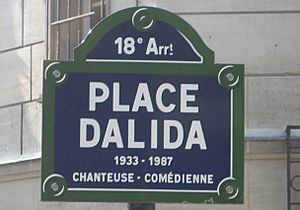
In 2003, Dalida was ranked third for "Greatest Singer of the Century" in France. This was based on album and single sales, radio plays, and chart positions. She was behind Madonna and Celine Dion, meaning she was still the number one favorite artist in France.
Many of Dalida's hits have been remixed into modern dance songs since her death. About 50 books have been written about her life. In 2009, Lara Fabian said Dalida influenced her the most. A square in Montmartre, Paris, is named Place Dalida and has a statue of her. There is also a street named "rue Dalida" in Laval, Quebec, Canada.
- 1965 – IFOP Poll: Voted "Favourite French singer."
- 1976 – Voted "Woman of the Year" in Canada, ahead of Jackie Kennedy.
- 1982 – Paris Match magazine survey: Dalida was the only person from show business on a list of most influential French women.
- 1985 – Voted "Favourite French singer" (Télé 7 Jours magazine).
- 1986 – VSD magazine survey: Voted "Favourite French singer."
- 1988 – SOFRES/Encyclopædia Universalis survey: 10% of the French public voted the "Death of Dalida" as having a great impact, compared to 16% for the "Death of Général de Gaulle."
- 1989 – Encyclopædia Universalis: Concluded that Dalida was the second person with the biggest impact on French society, after President de Gaulle.
- 2001 – IFOP Survey: Voted the "Most important female singer who had the greatest impact on French society in the 20th century," along with Édith Piaf.
- 2005 – Voted "Favourite singer in 2004" among Italians.
- 2005 – Voted "Top 58th French person of all time" in a survey sponsored by France 2 TV.
Tributes
- In 1987, Dalida was honored with a commemorative coin by The French Mint, Monnaie de Paris.
- In 1997, on the 10th anniversary of her death, Place Dalida was created in Paris with a statue of her.
- In 1998, a tribute was held in Cairo, and the "Dalida Prize" was created in her honor.
- In 2001, the French government honored her with a second stamp featuring her likeness. Over 10 million copies were sold.
- In 2002, the TV show Dalida, 15 ans déjà (Dalida, 15 years already) marked the 15th anniversary of her death.
- In 2005, the first movie about Dalida, a two-part TV film Dalida, was broadcast. It reached 13 million viewers, setting a record for France 2.
- In 2007, the "Dalida Expo" was held in Paris City Hall to celebrate the 20th anniversary of her death. It showed her outfits, belongings, and photos. 300,000 people visited the exhibit.
- In 2012, the TV show Dalida, 25 ans déjà (Dalida, 25 years already) marked the 25th anniversary of her death.
- In 2016, the second movie about her, Dalida, premiered at the Olympia. This was the first time the hall was used for a movie.
- In 2017, a second Dalida Expo was held at Palais Galliera for her 30th anniversary. It had 100,000 visitors, a record for the gallery.
- In 2019, she was featured as a Google Doodle on what would have been her 86th birthday.
Depictions
Several plays and films have been made about Dalida's life.
- In 1999, the play Solitudini – Luigi Tenco e Dalida was performed in Rome.
- Dalida: Une Vie, a play approved by Orlando Productions, was performed from 2003 to 2006 in Quebec, Canada, and in Beirut, Lebanon.
- In 2005, a two-part TV film, Dalida, starred Sabrina Ferilli as Dalida. It was a huge success with 13 million viewers.
- In 2005, the play Dalida, à quoi bon vivre au mois de mai ? was performed in Montmartre.
- In 2017, the film Dalida, directed by Lisa Azuelos, starred Sveva Alviti as Dalida. It premiered at the Olympia Music Hall.
Discography
Filmography
| Year | Title | Role | Notes | Ref |
|---|---|---|---|---|
| 1954 | Le Masque de Toutankhamon | "short role of a spy" | ||
| 1954 | A Glass and a Cigarette | Iolanda | ||
| 1958 | Brigade des moeurs (Vice Squad) |
Herself | ||
| 1958 | Rapt au deuxième bureau (Operation Abduction) |
Bella Morena | ||
| 1961 | Che femmina... e che dollari! | Laura Pisani | ||
| 1963 | L'inconnue de Hong Kong (Stranger from Hong-Kong) |
Georgia | ||
| 1965 | Menage all'italiana (Household alla Italiana) |
Armida | ||
| 1966 | La morale de l'histoire (The moral of the story) |
Colette | ||
| 1968 | 13 jours en France | Herself (Uncredited) | Documentary | |
| 1968 | Io ti amo (I Love You) |
Judy | ||
| 1977 | Dalida: Pour toujours | Herself | Documentary | |
| 1986 | Le sixième jour (The Sixth Day) |
Saddika |
Awards
| Year | Award | Country | Category | Result |
|---|---|---|---|---|
| 1954 | Miss Ondine Cairo | Egypt | Beauty competition/pageant | Second Place |
| 1958 | Radio Monte Carlo Oscars | France | Radio Monte Carlo Oscar | Won |
| 1958 | Paris Olympia music hall Bravos | France | Paris Olympia music hall Bravos (Shared recognition with Yves Montand) | Won |
| 1959 | Platinum Oscar Awards | Italy | Platinum Oscar Award | Won |
| 1959 | Golden She-Wolf Award | Italy | Golden She-Wolf Award | Won |
| 1959 | L'Oscar de la chanson Awards | France | L'Oscar de la chanson Award for Best Song | Won |
| 1959 | Radio Monte Carlo Oscar Awards | France | Radio Monte Carlo Oscar | Won |
| 1960 | Grand Prix Awards | Italy | Grand Prix Award for Best Italian Song (Shared award with Charles Aznavour) | Won |
| 1961 | Radio Monte Carlo Oscar Awards | Italy | Radio Monte Carlo Oscar | Won |
| 1962 | Radio Monte Carlo Oscar Awards | Italy | Radio Monte Carlo Oscar (Shared award with Johnny Hallyday) | Won |
| 1963 | Radio Monte Carlo Oscar Awards | France | Radio Monte Carlo Oscar for Most Successful International Artist | Won |
| 1964 | Juke Box Global Oscar Awards | Italy | Juke Box Global Oscar for The Year's Most-Played Artist on Jukeboxes in Italy | Won |
| 1965 | Chico Viola Prize | Brazil | Chico Viola Prize for "Zorba o Greco" | Won |
| 1966 | Paris Olympia music hall Bravos | France | Les Bravos du Musique Hall | Won |
| 1967 | Golden Caravel Awards | Italy | Golden Caravel Award | Won |
| 1968 | Canzonissima Oscar | Italy | Canzonissima Oscar | Won |
| 1969 | MIDEM Prize | Italy | MIDEM Prize for Highest Selling Musical Artist | Won |
| 1969 | Radio Luxembourg Hit Parade Oscar Awards | France | Radio Luxembourg Hit Parade Oscar | Won |
| 1969 | Radio Luxembourg Hit Parade Oscar Awards | France | Radio Luxembourg Hit Parade Oscar | Won |
| 1972 | Popularity Oscar | France | Popularity Oscar for Most Popular Artist | Won |
| 1973 | APPCB (Association Professionnelle de la Presse Cinématographique Belge) Awards | Belgium | Gold Medal Award | Won |
| 1974 | Golden Gigi award | Spain | Golden Gigi Award (Special award) for Extraordinary Record Sales | Won |
| 1974 | Golden Heart Awards | Spain | Golden Heart Award for Most Popular Artist in Spain | Won |
| 1975 | L'Académie du Disque Français Awards | France | Global Oscar Oscar Mondial du Disque Award for "Gigi l'Amoroso" and "Il venait d'avoir dix-huit ans" | Won |
| 1975 | Oscar Awards | France | Eight Oscar Awards awarded at the Olympia in recognition of extraordinary, rare, and, distinguished achievements. | Won |
| 1975 | Golden Lion Awards | Germany | Golden Lion | Won |
| 1976 | French Summer Carnaval Awards | France | French Summer Carnaval Award | Won |
| 1976 | French Academy Awards | France | French Academy Award for a number one single in nine countries | Won |
| 1979 | Radio Monte Carlo Awards | France | Belgium – Musique Award | Won |
| 1981 | Goldene Europa Awards | Germany | Goldene Europa for Artist of the Year in Germany | Won |
| 1984 | Légion d'honneur | France | Highest French order of merit for military and civil merits | Declined |
| 1985 | Golden Butterfly Awards | Turkey | Golden Butterfly Award | Obtained |
| 1987 | Dalida Award | Turkey | Dalida Award (Special Award) for Best Performance in Brussels Belgium | Obtained |
Honours and Decorations
 Commander of the Ordre des Arts et des Lettres of the French Republic.
Commander of the Ordre des Arts et des Lettres of the French Republic. 1962: Honorary Citizen of Calabria.
1962: Honorary Citizen of Calabria. 1968: Godmother of Montmartre street children.
1968: Godmother of Montmartre street children. 1980: Honorary Citizen of Graulhet.
1980: Honorary Citizen of Graulhet.
|
See also
 In Spanish: Dalida para niños
In Spanish: Dalida para niños
- List of Dalida live performances
- List of Dalida music in motion pictures and TV
- Mononymous persons
- Culture of France
- Music of France
- Music of Italy
- Music of Egypt
- Cinema of Egypt
- List of cultural icons of France
 | DeHart Hubbard |
 | Wilma Rudolph |
 | Jesse Owens |
 | Jackie Joyner-Kersee |
 | Major Taylor |


